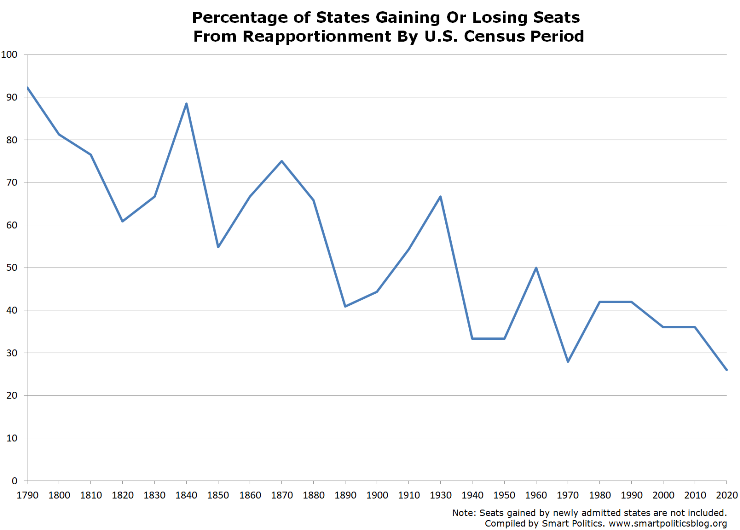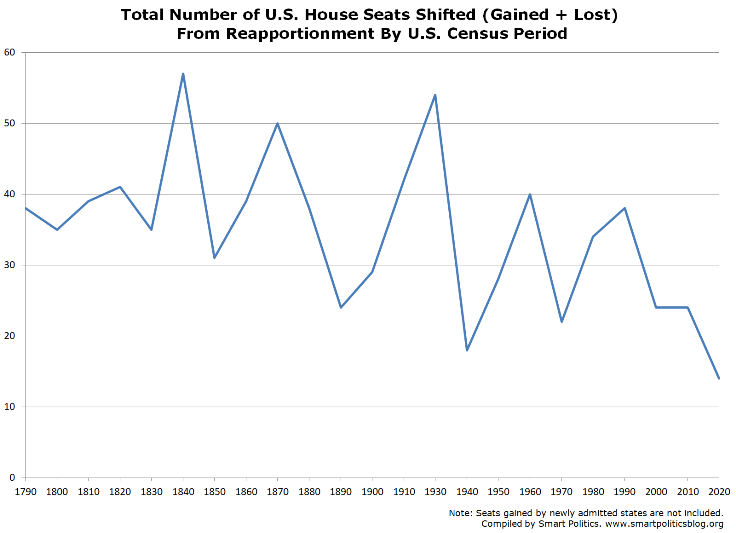2020 US Census Reapportionment Is the Most Stable in US History
Only 14 seats (3.2 percent) across 13 states (26 percent) changed hands following the latest Census – the lowest numbers in history

The general geographic trends seen in recent decades continued with this apportionment – a reduction of seats located in the Midwest and Northeast and an increase in the South and West.
However it is the scale of change, or lack thereof, which is the real story.
Smart Politics examined every congressional reapportionment going back to 1790 and found that the percentage of states gaining or losing seats, the raw number of seats reallocated, and the percentage of seats reallocated all came in at historic lows during this latest apportionment.
For starters, the delegation size of just 13 states (26 percent) was affected by the new U.S. Census numbers.
That is the lowest percentage of states affected by reapportionment in history and the lowest raw number of states since the apportionments of 1800 and 1810 when 13 states also gained or lost seats (excluding new states).
One big difference of course, is the country had far fewer states in the early 19th Century. [Note: Following the 1790 Census, the U.S. House delegation changed in 12 of the 13 states – all but Delaware].
In only five other cycles have less than 40 percent of states seen their number of U.S. Representatives increase or decrease after reapportionment, following the Censuses of 1940 (33.3 percent, 16 states), 1950 (33.3 percent, 16 states), 1970 (28 percent, 14 states), 2000 (36 percent, 18 states), and 2010 (36 percent, 18 states).
Additionally, only 14 seats shifted during the new apportionment (seven seats gained and seven seats lost), or 3.2 percent.
That is also the lowest raw number and percentage of seats to shift in U.S. history and far below the historical average of 34.5 seats. [Note: This data also excludes seats gained by newly admitted states].
Prior to the 2020 reapportionment, the fewest number of seats lost and gained in a given cycle came after the 1940 U.S. Census at 18 seats (4.1 percent).
Since the number of U.S. Representatives stabilized at 435 seats following the 1910 Census (with the exception of a very brief period of 437 seats after Alaska and Hawaii were granted statehood), an average of 29.6 seats were gained or lost following reapportionment, or 6.8 percent of the chamber.
That is more than double the number and percentage of seats that changed hands this cycle.
The largest number of seats ever gained and lost in a cycle was 57 following the 1840 Census. [Note: The total size of the chamber was reduced by 19 seats for the subsequent 28th Congress in 1843].
The next biggest change came after the 1930 Census at 54 seats (12.4 percent) – not so surprising since there had been a 20-year gap since the previous reapportionment.
Forty seats shifted after the 1960 Census (9.2 percent) with 38 after the 1990 Census (8.7 percent) and 34 after the 1980 Census (7.8 percent).
Just 24 seats shifted following the 2000 and 2010 Censuses (5.5 percent) – tied for the third lowest in U.S. history behind the 22 that changed hands after the 1970 Census (5.1 percent).
Follow Smart Politics on Twitter.



While both IA and MN have dodged a bullet, so to speak, a tumultuous redraw process may yet await the incumbent members thereof; due to major INTRA-STATE population changes, IA in 2001-02, and MN in both 1981-82 and 2001-02 underwent massive alterations to their district boundaries despite no net changes. [MN went from 3 urban-5 rural to “4-4” in 1982, and “4-4” to 5 urban-3 rural in 2002. Perhaps 6 to 2 this round?]